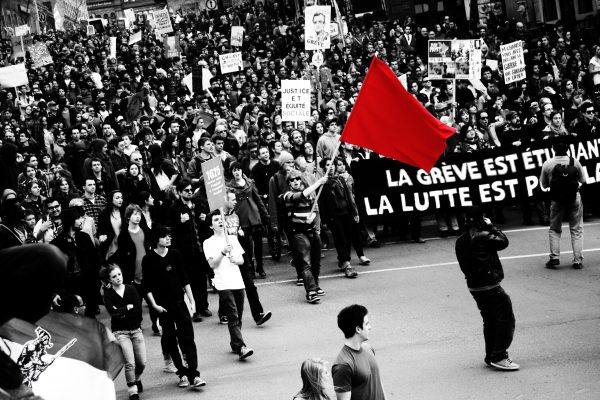
“These people are few in number. These people control everything. They always want to control more. These people have common interests. These people have a common political project. […] We need to stop being afraid of words. We must call these people by their name. These people are the ruling class. These people are the bourgeoisie. The struggle against the tuition increase, the struggle of those who are indignant all over the world must be called by its name. It is a class struggle.”
Gabriel Nadeau-Dubois, 2011
In the spring of 2012, half a million students in Quebec staged the largest student strike in North American history. The strike, which lasted six months, toppled the Liberal government and put an end to the hated 75 per cent tuition hike.
One of the main lessons from this fantastic movement was that it did not come out of the blue: it was prepared politically. For months, student leaders waged a vast campaign explaining the tuition increase, austerity in general, and the need for a student strike. The Liberal government of Jean Charest, determined to pursue its austerity agenda, was not going to be “convinced” to back down: the education system had to be shut down to force him.
Gabriel Nadeau-Dubois, who led the movement, explained: “to build this strike, thousands of young activists woke up very early every morning, […] distributed a monstrous amount of newspapers.” And, “when we began this mobilisation, […] between 10 to 15 per cent of the students were against this tuition increase. The vast majority were in favour of it. But for two years we went to talk sometimes for hours with every student in our local associations one after the other.”
With this meticulous political work, student leaders convinced the majority. Without it—the strike would never have succeeded.
Another component: ideas. The leadership connected the struggle against the tuition increase to the wider struggle unfolding around the world. The newspaper of ASSÉ, the main student organisation, said: “Everywhere around the world […] people are revolting and demanding their due. […] After the Arab Spring, will we see the Quebec Spring? […] The response from ASSÉ is categorical: we must. […] Faced with the scale of the challenge, there can be no hesitation.”
This broader understanding gave the movement inspiration, tenacity and a fighting spirit. Inspired and armed with this understanding, hundreds of thousands of students took matters into their own hands.
The potential of this was realised through rank-and-file democracy. At every turn, mass general assemblies were held, where students debated and decided on next steps, formed committees, and elected their leaders. This broad rank-and-file democracy was a key ingredient of the struggle: it gave students ownership—they saw it as their struggle.
As the major decisions concerning the struggle were in the hands of the students themselves, they were also able to hold their leaders to account. This was the case in early May 2012, when students in their mass general assemblies rejected a rotten compromise which was negotiated between the student leaders and the government.
This allowed students to feel their collective power and gave them resolve to smash down all barriers in their way. This was the case when on May 18, the government imposed the infamous Bill 78: a law made to break the strike and attack the right to demonstrate. In response, the main student union, ASSÉ, called to defy this repressive law. This unleashed the largest act of civil disobedience in Canadian history as 400,000 people took to the streets of Montreal on May 22.
Faced with this unending mass movement, the Liberal premier Jean Charest called an election stating that this was a choice between “chaos or order.” The government was defeated and the new government cancelled the tuition fee hike, and repealed Bill 78.
These are the methods we must use in the fight for a free Palestine. If we do, we will win.

